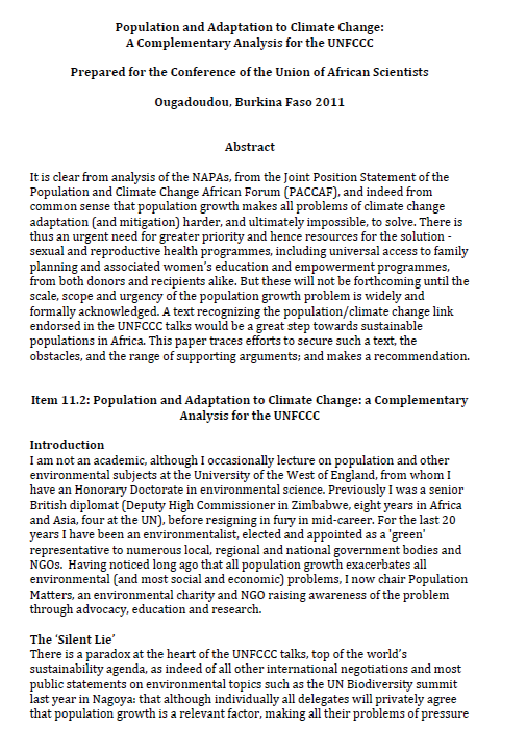Dear Aubrey
Like Kofi Annan in his Key Recommendation at the 2009 GHF, we strongly support Contraction and Convergence with a population base year". The population base year is an absolutely essential feature of any scheme relying on the concept of per capita entitlements. Thank you, and good luck with this. Roger Martin Chair Optimum Population Trust
~~~~~~~~~~~~~~~~~~~~~~~~~~
The evolution of our draft text dates from 2009, and the preparations for COP 15 at the Copenhagen Summit. Population Matters was asked to give a workshop on the population/climate change link at the Global Humanitarian Forum in Geneva. Having found no opposition to the principle, I discussed the idea with the Chairman Kofi Annan; who subsequently included in his Key Recommendations: “Contraction and convergence, with a population base year, should be the basis of [climate equity]”; and “Population stabilisation should become a priority for sustainable development”. Further discussions at a workshop in the pre-COP 15 talks in Barcelona confirmed that there was diffuse support from individuals for the principle of a text; and a draft was circulated at a pre-Summit Danish Government seminar at which Population Matters was the invited platform NGO.
"Contraction and Convergence is a prime example of a UNFCCC-compliant Global Climate Change Framework. It is a rational formulation for reconciliation of 'Climate Justice without Vengeance'. Several ideas derived from C&C have surfaced since Kyoto with ideas that can be perhaps in various ways incorporated into C&C. However, there is an overwhelming need for an over-arching UNFCCC-compliant Framework that enables the globally competing interests of the over-consuming and the under-consuming to be reconciled with each other and with the objective of the UNFCCC in a non-random manner. We feel that C&C is the veteran and indeed the apex example of this and urge you to consider our request. At Kyoto in December 1997 and shortly before they withdrew from these negotiations, the USA stated, “C&C contains elements for the next agreement that we may ultimately all seek to engage in.” The adversarial reasons for their withdrawal then were in play again at COP-15. C&C answers this in a unifying and constitutional way and the need for this answer becomes increasingly critical."
Letter & signatories at: -
Roger Martin
Chair, Optimum Population Trust
Steven Earl Salmony
AWAREness Campaign on The Human Population [estab. 2001]
Jonathon Porritt
Forum for the Future
Sara Parkin,
Founder Director, Forum for the Future
OPT recommends: -"That the principle of “contraction and convergence” (rich and poor converging towards a common per person emissions target) be accepted as an equitable starting point for distributing total tolerable carbon emissions, provided that this is allocated to states on the basis of their population size at a specific date. This would encourage the adoption of population restraint policies; whereas allocation on a simple per person criterion would encourage continued population growth, thus continuously reducing every person’s carbon entitlement."
Statement endorsed by: -
Sir David Attenborough,
Naturalist, Broadcaster and wildlife film-maker*
Prof Sir Partha Dasgupta,
Frank Ramsey professor of economics, University of Cambridge*
Prof Paul Ehrlich,
Professor of population studies, Stanford University*
Prof John Guillebaud,
Emeritus Prof family planning, University College, London*
Susan Hampshire,
Actor and population campaigner*
James Lovelock,
Gaia scientist and author
Professor Aubrey Manning,
Pres Wildlife Trust, Emeritus Prof Natural History, Edinburgh University
Professor Norman Myers,
Visiting Fellow, Green College, Oxford University*
Sara Parkin,
Founder/Dir and trustee, Forum for the Future*
Jonathon Porritt,
Founder/Dir, Forum for the Future; Fmr Chair, UK Sus. Dev. Commission*
Professor Chris Rapley,
Former director, the British Antarctic Survey
The Optimum Population Trust on C&CContraction and convergence - What is a sustainable lifestyle? Humanity as a whole is already consuming more resources than the earth can in the longer term provide. Therefore consumption in the richer countries will have to be reduced to allow those in poorer countries to attain a decent lifestyle. Consumption will inevitably grow in developing countries as they industrialise and urbanise, even if they take on board the need for sustainable lifestyles. It will be up to wealthier communities, principally in developed countries, to moderate their lifestyles and adopt consciously green practices. We already know that what one country considers acceptable would be considered far from acceptable to another. How should the level be set? By whom? On what criteria?
The concept of Contraction and Convergence (C&C) was conceived by the Global Commons Institute in the early 1990s. The principle is that the rich should consume progressively far less resources per capita than before, while the poor consume rather more than they did, so we converge towards a common ‘fair share’ for each, which the planet can sustain. We support this principle of C&C or global equity, but it must take account of the plain arithmetic fact that every additional person reduces everyone else’s sustainable share. We have therefore insisted on including a population base year at which the ultimate target figures, notably for sustainable carbon emissions per person, should be calculated country by country. Without it, countries with high population growth would consume ever more, at the expense of those who had succeeded in restraining or reducing their numbers.
We were delighted when Kofi Annan endorsed our view in his Chairman’s Key Recommendations following a conversation we had with him after a workshop we gave at the Global Humanitarian Forum in June 2009. Population numbers, lifestyles, and sustainable technologies are a classic trade-off. If we want a sustainable future, we need to address not one or two but all three of these issues in parallel.
Population Matters



